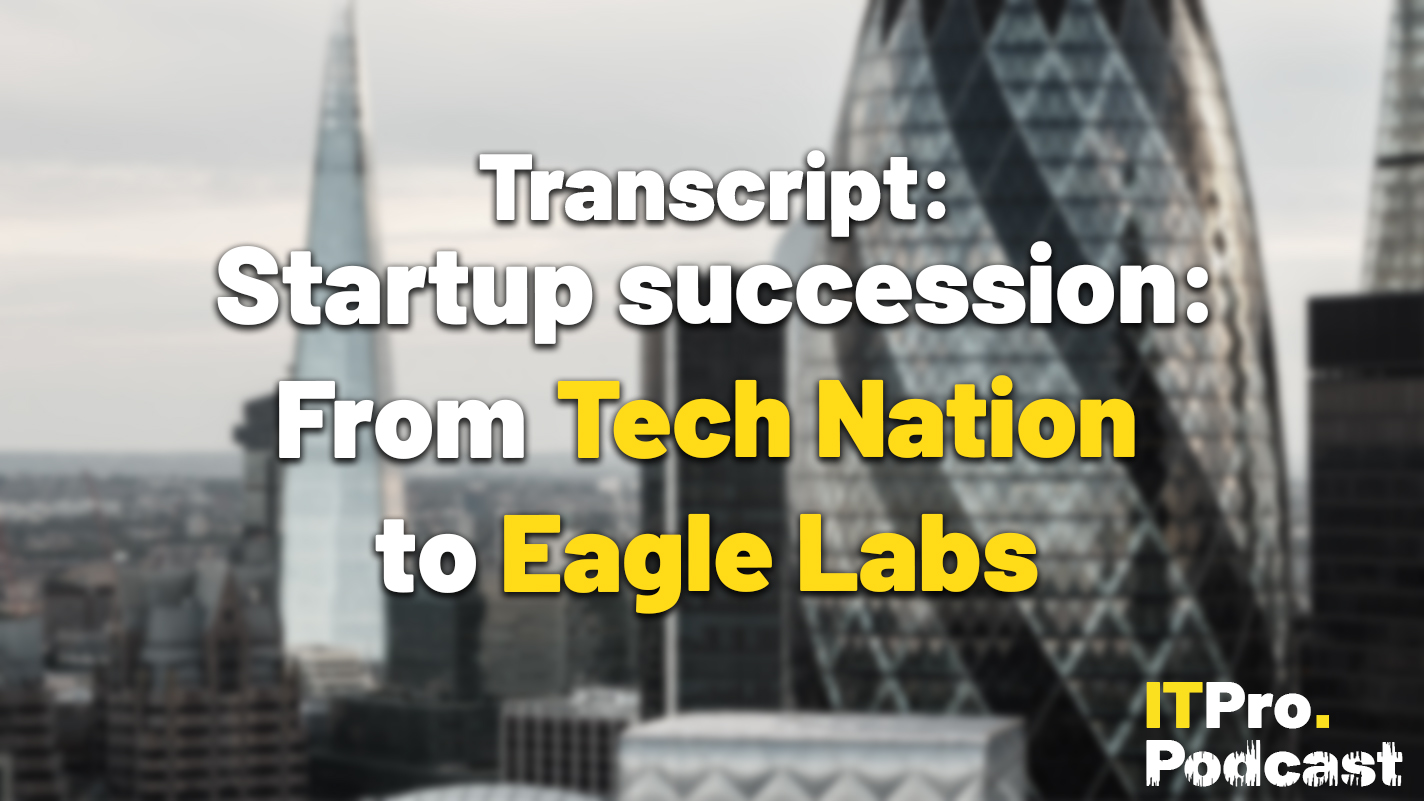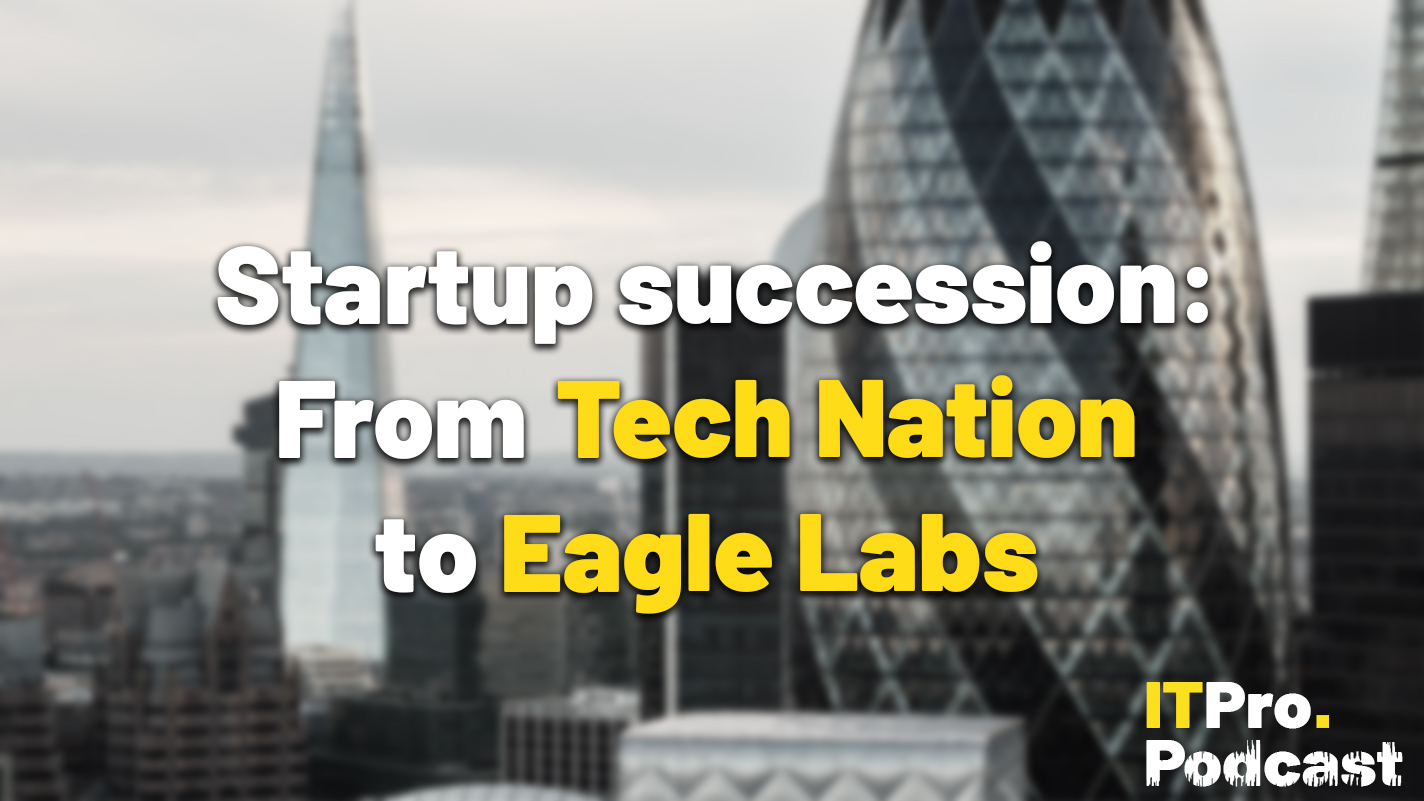How accelerator programmes are making startups more agile
With the number of new startups constantly growing, the need for high-quality support is greater than ever than ever

While there's no denying that the world's economies have been through numerous challenges over the last few years, it doesn't mean business isn't thriving. In fact, there couldn't be a bigger appetite for entrepreneurship.
Despite the risks associated with launching a company, more and more people are doing it. In the UK alone, more than 80 businesses were set up per hour last year, according to research from government-backed enterprise scheme Startup Britain.
An estimated 342,927 businesses were launched between January and June 2016, the campaign claims, indicating that entrepreneurs are taking the plunge thanks to new funding and support opportunities.
But while it's important to get strong support of help to get a company up and running, things don't stop there. Scaling a new business can take time, and it's important to stay as agile as possible in these early stages. Luckily, there's plenty of help available, with accelerator programmes being an excellent example.
Accelerator programmes have become a popular way for new startups and entrepreneurs to gain a structured route to sustainability and growth. Often, they will offer places to a select amount of promising startups and give them access to a collaborative working environment, mentors, business experts and potential investors.
Fostering relationships
Startupbootcamp is one of the biggest and most popular accelerator programmes. With a focus on emerging technologies such as the Internet of Things, smart transport, fintech and digital health, the organisation has operations in Amsterdam, Berlin, Istanbul, London, Barcelona, Rome, Singapore and Mumbai. Since launching in 2010, it's supported 404 startups.
Get the ITPro daily newsletter
Sign up today and you will receive a free copy of our Future Focus 2025 report - the leading guidance on AI, cybersecurity and other IT challenges as per 700+ senior executives
Andy Shannon, head of global at the company, is a huge believer in the impact accelerator programmes have on companies. He explains that programmes can work for businesses at all funding stages and that they help facilitate the future success of new startups. On average, companies on the Startupbootcamp programme go on to raise over 700,000 from investors. This is made possible thanks to strong relationships with partners.
"With specialised programmes that focus on specific industries such as digital health, insurance or food tech, startups within our accelerators can tap into tailored expertise from hundreds of corporate partners including Cisco, Intel, Lloyds Banking Group, Rabobank and others," he tells IT Pro.
"While the end goal for joining an accelerator should not always be about raising a huge VC round, it's certainly a tangible route towards that goal. At Startupbootcamp, 70% of alumni raise an average round of 700K within six months of completing a three month accelerator programme.
"This high success rate could be due to the intense finance-readiness the startups go through during the programmes, in which they are trained on creating a fundraising deck, guidance on the most suitable fundraising route and facilitating one-to-one meetings with the leading early-stage investors.
"For agile startups, regardless of their fundraising stage, it's important to develop and nurture relationships with investors in order for them to understand what investors look for and who the key investors are in their industry or region."
A new startup ecosystem
Although there are organisations that solely offer acceleration schemes out there, it's also a trendy option for co-working companies. TechHub Swansea, a Welsh company that offers co-working space to tech startups, launched the IdeasFund accelerator programme in 2016. Run in collaboration with the Welsh Government, it provides successful applicants with over 5,000 in funding, free desk space and two months of tech-focused mentorship.
Jennifer Clay, CEO of the co-working centre, says these programmes offer startups and entrepreneurs a unique opportunity to accelerate growth in a short space time. She says companies benefit from schemes like this because they're exposed to world-class business support, facilities and investment.
"With this boom in startup creation in recent years, it's easy to see why accelerator programmes are becoming ever more prevalent. The clue is in the title of such programmes," she tells IT Pro.
"The 'accelerator' is a fixed programme usually lasting a few months and provides the startup with a hugely intensive and immersive education from both mentors and peers within their cohort. Ultimately the startup and/or company founders learn-by-doing at a rapid pace.
"Startups joining accelerators are usually early-stage, and growth-driven companies looking for mentorship, education and financing. At this stage in their life-cycle coupled with the mentorship and funding they receive in such a condensed time period, it affords them the opportunity to move quickly, pivot and react to advice and guidance in order to 'accelerate' their growth."
Agile working environments
Accelerators attract interest from new startups and entrepreneurs because they provide them with the tools they need to succeed. DigitalBridge, which uses computer vision and machine learning to allow consumers to experience home dcor products before buying them, is one of the firms to have benefited from an accelerator.
It took took part in John Lewis' JLAB accelerator programme in 2016 and received 100,000 investment from the retail giant. David Levine, CEO of the startup, credits the success of his company to the support offered by John Lewis. He says that the programme helped him gain key industry contacts, achieve aims quickly and develop the company's product.
"We spent nearly three months being part of the John Lewis JLAB accelerator programme. Being based within John Lewis' HQ in London -- working that closely with senior executives, including the CEO -- was a turning point for the business because we got real insight into what retailers are looking for from the technology we are developing," he says.
"It put us in close contact with the people we wouldn't have otherwise had access to and enabled us to get advice directly from our target customers. We were assigned a mentor within the business to help us navigate internally. It saved time guessing what might work and gave us more opportunity to develop the product exactly as companies like John Lewis would use it.
"Being close to executives meant we could move quicker in developing the product because we knew instantly what they wanted from [it] both now and going forward, so we could stay ahead of the competition. It also gave us access to funding [and] at the end of the programme John Lewis invested 100,000 in the business, which we have been able to use to expand the team and accelerate our journey to market."
It can be tough running a business, especially in the first few days. But thanks to the rise of business accelerators, new opportunities for entrepreneurs and startups have arisen. While there are already a wide selection of programmes available, there's no doubt that we'll see more launch over the years. There's certainly a hunger for entrepreneurship, and this will only grow.
Nicholas Fearn is a freelance technology journalist and copywriter from the Welsh valleys. His work has appeared in publications such as the FT, the Independent, the Daily Telegraph, the Next Web, T3, Android Central, Computer Weekly, and many others. He also happens to be a diehard Mariah Carey fan. You can follow Nicholas on Twitter.
-
 Women show more team spirit when it comes to cybersecurity, yet they're still missing out on opportunities
Women show more team spirit when it comes to cybersecurity, yet they're still missing out on opportunitiesNews While they're more likely to believe that responsibility should be shared, women are less likely to get the necessary training
By Emma Woollacott
-
 OpenAI's new GPT-4.1 models miss the mark on coding tasks
OpenAI's new GPT-4.1 models miss the mark on coding tasksNews OpenAI says its GPT-4.1 model family offers sizable improvements for coding, but tests show competitors still outperform it in key areas.
By Ross Kelly
-
 Is Rishi Sunak’s ‘Unicorn Kingdom’ a reachable goal or a mere pipedream?
Is Rishi Sunak’s ‘Unicorn Kingdom’ a reachable goal or a mere pipedream?Analysis Plunging venture capital investment and warnings over high-growth company support raise doubts over the ‘Unicorn Kingdom’ ambition
By Ross Kelly
-
 Some Tech Nation programs could continue after Founders Forum acquisition
Some Tech Nation programs could continue after Founders Forum acquisitionNews The acquisition brings to a close a months-long saga over what the future holds for Tech Nation initiatives
By Ross Kelly
-
 Podcast transcript: Startup succession: From Tech Nation to Eagle Labs
Podcast transcript: Startup succession: From Tech Nation to Eagle LabsIT Pro Podcast Read the full transcript for this episode of the ITPro Podcast
By Rory Bathgate
-
 The ITPro Podcast: Startup succession: From Tech Nation to Eagle Labs
The ITPro Podcast: Startup succession: From Tech Nation to Eagle LabsITPro Podcast Some small firms are already lamenting the loss of Tech Nation, but Barclays Eagle Labs has much to offer the sector
By Rory Bathgate
-
 Don’t count Barclays Eagle Labs out just yet – it can deliver in ways Tech Nation never has
Don’t count Barclays Eagle Labs out just yet – it can deliver in ways Tech Nation never hasOpinion Tech Nation has a great track record, but Eagle Labs has the experience, the financial clout, and a clear-cut vision that will deliver positive results for UK tech
By Ross Kelly
-
 UK tech sector could face a ‘unicorn winter’ amid spiralling economic conditions
UK tech sector could face a ‘unicorn winter’ amid spiralling economic conditionsNews Tech Nation’s final piece of industry research calls for action to support continued ecosystem growth
By Ross Kelly
-
 "It's still not great": Industry divided on government's SMB tax relief package
"It's still not great": Industry divided on government's SMB tax relief packageNews The government’s handling of R&D tax credits has left SMBs with a “sense of disbelief”
By Ross Kelly
-
 UK startup's Equinix deal marks step towards broad quantum computing access
UK startup's Equinix deal marks step towards broad quantum computing accessNews Businesses around the world will be able to use its quantum computing as a service platform through Equinix
By Zach Marzouk